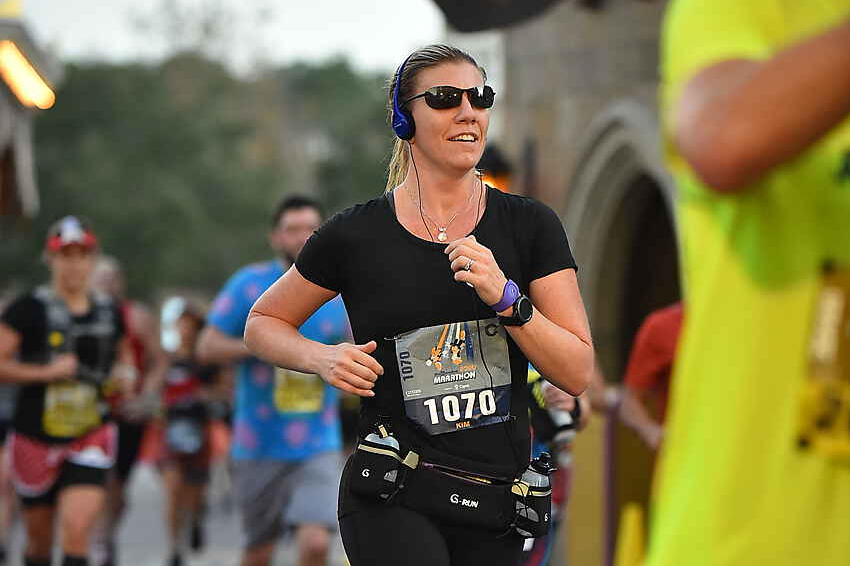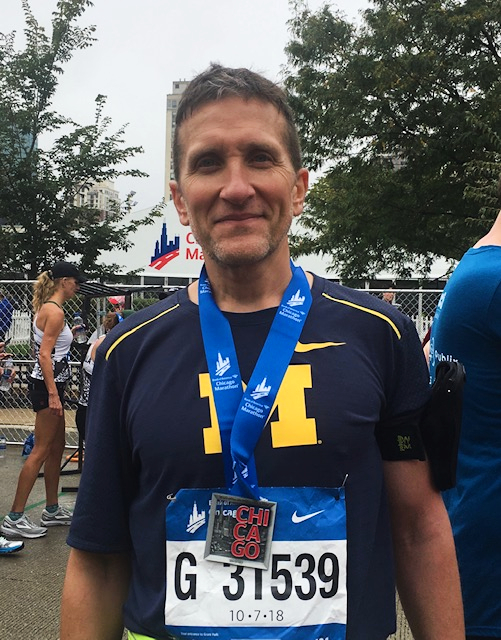‘Persevere and Maintain Hope’: Stepping Strong Runners Ready for Virtual Marathon
Seeking to curb the rapid spread of COVID-19, city officials canceled the Boston Marathon earlier this year for the first time in the race’s 124-year history. The pandemic, however, could not dampen the indomitable spirit of the thousands of runners and wheelchair athletes who will participate in the first virtual Boston Marathon, which can be completed between Sept. 5 and Sept. 14 along any 26.2-mile route the participant chooses.
Among this year’s athletes are 100 participants running to support The Gillian Reny Stepping Strong Center for Trauma Innovation at the Brigham. In interviews with Brigham Bulletin, three members of the Brigham’s Stepping Strong Marathon Team reflected on this historic experience in advance of their virtual marathon plans for this week.
About Stepping Strong
Established nearly seven years ago, The Gillian Reny Stepping Strong Center for Trauma Innovation has evolved from one family’s bold response to a personal tragedy to a thriving, multi-institutional, multidisciplinary hub that is transforming trauma research and care for civilians and military heroes who endure traumatic injuries and events. You can advance this critical work by supporting the Stepping Strong Marathon Team. Click here to meet members of the team or make a gift. Learn more about the center at BWHSteppingStrong.org.

Kimberly Fryling-Resare (Photo taken prior to pandemic.)
Name: Kimberly Fryling-Resare
Brigham affiliation: Patient, Brigham Multiple Sclerosis Center
Virtual marathon route: I’m planning on running around my town (Bristol, R.I.), including parts of the East Bay Bike Path and Colt State Park.
What inspired you to run for the Brigham?
I was diagnosed with multiple sclerosis at the end of 2003, and I’ve been a patient at the Brigham MS Clinic since 2003. About 11 years ago, I discovered running as a way to help me manage living with multiple sclerosis. It is a personal goal and dream of mine to run in the iconic Boston Marathon, and when the opportunity arose to run on the Stepping Strong Marathon Team, I felt it was truly serendipitous.
The Brigham has played such a huge part in me living extremely well with multiple sclerosis. Running on this team was my way of giving back and also a true testament to the amazing work that is done at the Brigham. The Stepping Strong Center gives trauma patients back their mobility and their lives — very much in the same way that the MS Clinic has assisted me for all of these years. How could I not proudly run for the Brigham?
As the pandemic continues, why was it important to you to still run this year?
So many things in this life are out of our control. I’ve learned this through years of living with a chronic illness. The best we can do is to persevere and maintain hope. I’ve started this experience, and I’m going to see it through to the finish.
It will be a very different marathon experience this year. What are your hopes for the big day?
Yes, it is not the experience that I was hoping for, but I raised close to $8,000 for the Stepping Strong Center, which is amazing. I owe it to them, my family and my friends and, most of all, I owe it to myself to complete this journey.
How will you celebrate your virtual marathon finish?
I have friends and family who are planning on supporting me along my route as well as celebrating with me at the finish.

Ahmet Uluer (Photo taken prior to pandemic.)
Name: Ahmet Uluer, DO, MPH
Brigham affiliation: Director, Adult Cystic Fibrosis Program, The Lung Center
Virtual marathon route: I will run from my house in West Roxbury to the Charles (through the Boston University campus) to the Seaport; back to the Charles and Memorial Drive to Harvard Square; and make my way to Commonwealth Avenue to the finish line downtown.
What inspired you to run for the Brigham?
I’ve been a causal runner for a while — a 5K here and there — but my first inspiration to run a marathon came when I found myself in our Emergency Department (ED) seeing a patient when casualties from the 2013 marathon bombing started streaming in.
The ED took on the appearance of a field hospital or a mobile medical unit near the front lines of a battlefield, but it was also surrounded by the familiar, reassuring faces of the ED staff I have come to know and trust as a pulmonologist at Brigham and Women’s Hospital. More bad news came when one of our beloved patients with cystic fibrosis (CF) — whom I was seeing just prior to the arrival of the marathon bombing victims — was diagnosed later that day with a complication that took her life just weeks later. These events left me in shock, and soon thereafter I started running, not only to help manage my own mental health but also to somehow honor the victims from that day.
In addition to gathering 10 patients with cystic fibrosis to run the marathon on various charity teams (including ours), my inspiration to run in 2020 came from my nephew-in-law, Ryan, who suffered incredible physical and emotional trauma while serving our country in Afghanistan as an Army Ranger. On Aug. 30, 2019, Ryan and his men came under fire in Afghanistan. Ryan suffered almost certain life-ending injuries that led to him eventually lose his right arm and leg, including part of his pelvis, as well as his left foot. His arrival to San Antonio was a miracle, as he traveled directly from Bagram Airfield in Afghanistan, refueling twice in the air and receiving lifesaving treatment during that harrowing trip.
My 26.2 miles pales in comparison to his physical sacrifice. I can only begin to imagine the strength and resilience needed to rehabilitate his larger-than-life physique. His wife, son, parents, siblings, grandparents and other family members, and his team of Army Rangers, all look up to him and gain strength from his unbelievable courage.
As the pandemic continues, why was it important to you to still run this year?
I had been training with one of our runners with CF whenever possible just prior to the pandemic and ran 18 miles before we received the expected, but still disappointing, news of the race’s cancellation. And though it is disappointing to be running virtually and without the cheering crowds to give me the much-needed emotional energy, I hate to leave my goal to complete this marathon unmet. At least two other people with CF will be running virtually with me.
It will be a very different marathon experience this year. What are your hopes for the big day?
The attention and encouragement we’ve received from our Stepping Strong Marathon Team — from Ali Luthman and Caroline Duncan, to John Furey, and to the amazing Reny family — renewed my desire to run the marathon. Their energy is infectious. I also hope to inspire our 10 runners with cystic fibrosis to take a second chance with me and apply for bibs to participate in the 2021 Boston Marathon!
How will you celebrate your virtual marathon finish?
I will celebrate with my family and virtually with my CF team members.

Ashley Buckley (Photo taken prior to pandemic.)
Name: Ashley Buckley
Brigham affiliation: Manager of Hospitality, Brigham Health
Virtual marathon route: I will be taking off from my residence in West Roxbury, running past the Brigham towards Kenmore Square, down Beacon Street, onto Commonwealth Avenue, and all the way to Newton Marriott, where I will turn around and finish at the Brigham. I decided to end my route at the Brigham, as it’s symbolic of my connection to the Stepping Strong Marathon Team and my commitment to the Brigham!
What originally inspired you to run for the Brigham?
When I started here as a volunteer 16 years ago, I never thought I was going to work in health care. Once I started full time after graduating college in 2013, I fell in love with helping patients. Running for the Brigham gives me a different opportunity to help those who need it most.
As the pandemic continues, why was it important to you to still run this year?
I never in my wildest dreams thought I would run a marathon during a pandemic. This year, I am running in honor of my cousin and her husband, whose lives changed after a horrific car accident. I am running for them, for those who cannot, for those who have endured trauma during COVID and for myself.
It will be a very different marathon experience this year. What are your hopes for the big day?
My hope is that I finish my run at a reasonable time. During the peak time of COVID, I had stopped training because in the beginning I was unsure if I was going to run, but I decided I needed to do this. I just hope I choose a nice sunny day that is not too hot.
How will you celebrate your virtual marathon finish?
I have done many races over the years, and I would not be able to do them without the support of all the amazing people I have in my life. As a tradition, I ask my mom to wait for me at the finish line with a doughnut or two — I need to ask for two, as my dad (Leo F. Buckley Jr., MBA, executive director of Business Operations in Patient Care Services and Nursing) sometimes will eat one!

Leave a Reply